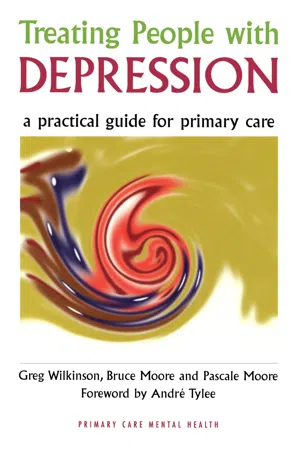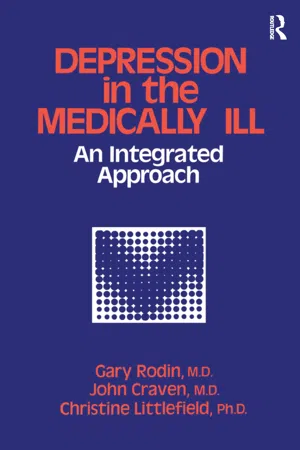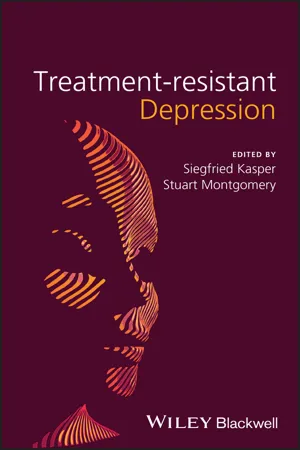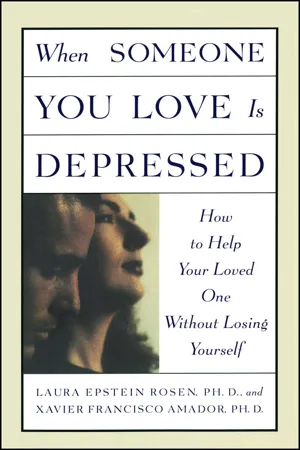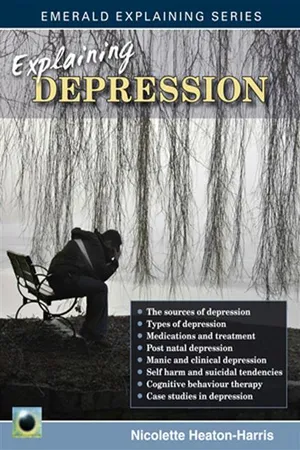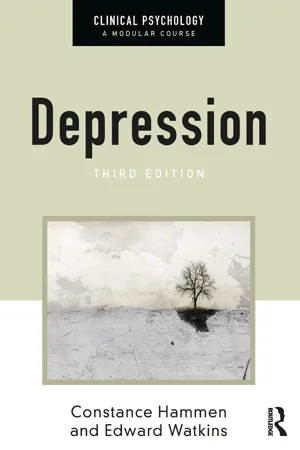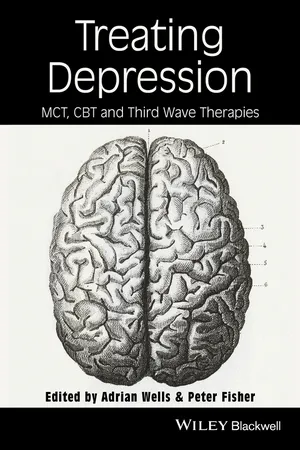Psychology
Depression Treatment
Depression treatment involves various approaches aimed at alleviating symptoms and improving overall well-being. Common treatments include psychotherapy, medication, and lifestyle changes. Psychotherapy, such as cognitive behavioral therapy, helps individuals address negative thought patterns, while medications like antidepressants can help regulate brain chemistry. Lifestyle changes, including exercise and stress management, also play a crucial role in managing depression.
Written by Perlego with AI-assistance
Related key terms
9 Key excerpts on "Depression Treatment"
- eBook - ePub
Treating People with Depression
A Practical Guide for Primary Care
- Greg Wilkinson, Bruce Moore, Pascale Moore(Authors)
- 2018(Publication Date)
- CRC Press(Publisher)
8 Psychological treatmentBackground
The term depression in this chapter refers to non-bipolar, non-psychotic (i.e. not hallucinated or deluded) depressive disorder, since this is the type of mood disturbance for which cognitive behaviour therapy for depression was designed and with which it has been most extensively tested.It appears likely that no one single factor can explain the occurrence of depression, but rather that it results from an interaction between multifarious factors (see Box 8.1 ). Its onset and course have been shown to relate to a variety of biological, historical, environmental and psychosocial variablesBox 8.1 Factors in the aetiology of depression- disturbances in neurotransmitter functioning
- a family history of depression or alcoholism
- early parental loss or neglect
- recent negative life events
- a critical or hostile spouse
- lack of a close confiding relationship
- lack of adequate social support
- long-term lack of self-esteem
The traditional medical approach to the treatment of depression has long been criticised for having a limited outlook and for neglecting personal and social issues. As a result, a variety of specialist psychological treatments have been developed to treat depression, either as an adjunct to medical treatment or independently. Psychological therapies have been found to be effective in mild-to-moderate depression and also have a beneficial role in the long-term treatment of those with severe depressive illness.In most cases, depression is time-limited. Untreated episodes usually resolve within 3-6 months. However, relapse is frequent, and some 15–20% of people follow a chronic course. For this reason, treatment must aim not only to speed recovery from the current episode but also to maintain improvements and, if possible, to reduce the likelihood of recurrence. It is this concern which has encouraged the development of psychological treatments designed to teach patients active depression-management skills. - eBook - ePub
Depression And The Medically Ill
An Integrated Approach
- Gary Gary Rodin(Author)
- 2017(Publication Date)
- Routledge(Publisher)
9Psychological Treatments
Considering the wide array of factors that may contribute to depression in persons with a physical illness, an eclectic and integrative approach is needed in the selection of optimal and appropriate treatment. Such treatment may include practical physical interventions, and pharmacologic, psychological, and social treatments. Additional interventions that may relieve depression include optimizing the medical status of the patient, restructuring the social environment, assisting with occupational functioning, and identifying and eliminating depressogenic drugs that are not essential to the medical treatment. Even when a broad range of factors can be identified that contribute to or perpetuate depression in a medical patient, attention to one specific underlying factor may alleviate the mood disturbance. For example, when major depression is associated with hypothyroidism, the gradual institution of thyroid replacement medication not only takes precedence over other specific antidepressant treatments, but may, by itself, relieve the depression. In other cases, medical treatments should be instituted concurrently with psychological and biological therapies for depression.In the medical setting, the etiology of depression should usually be understood from multiple perspectives. Similarly, treatment selection often requires the consideration of diverse modalities. For the purpose of clarity, we have divided into separate chapters our discussion of biological and psychological treatments. However, this literary convenience should not be taken to imply that the use of one treatment modality in any way precludes the concurrent or sequential use of others. In this regard, although the efficacy of antidepressant medication for major depression has been substantiated in a variety of controlled studies (see Chapter 11 - eBook - ePub
- J. Mark G. Williams(Author)
- 2013(Publication Date)
- Routledge(Publisher)
Chapter 4
Psychological treatment of depression:Outcome studies
Although theories about the aetiology, precipitation and maintenance of depression differ from each other, the treatment techniques predicted to be effective by the various models tend to converge. That is not to say that there are only a few methods used. On the contrary, I shall list over twenty techniques which have been applied, usually grouped in some multifaceted procedure, to clinically depressed patients. But each of these techniques could be argued to be affecting a subsystem of several of the psychological models outlined in Chapters Two and Three. In this chapter I should like to overview these procedures and the evidence for their effectiveness. In addition, I wish to discuss three other issues. First, the supposed commonality in procedures and in the factors mediating recovery. Second, the evidence for whether there exist any indications and contra-indications for the use of cognitive-behaviour therapy with depressed patients, or any evidence on which technique to use with which patient. Finally, the relationship of cognitive-behaviour therapy to pharmacotherapy will be discussed. In an early paper Whitehead (1979) outlined four general, though distinct, rationales from which cognitive and behavioural strategies were derived:- That the depressive behaviour per se constitutes the disorder and can be modified by suitable manipulation of reinforcers.
- That depressive behaviour is a result of (or is maintained by) a reduced rate of positive reinforcement and that this reinforcement should be reinstated by a suitable manipulation.
- That depressed individuals fail to respond because they believe themselves to lack any control over their environment. Treatment should be directed towards demonstrating their capability for such control.
- eBook - ePub
- Siegfried Kasper, Stuart A. Montgomery(Authors)
- 2013(Publication Date)
- Wiley-Blackwell(Publisher)
Emerging in the 1960s and 1970s in response to concerns about the use of longer-term, psychodynamically focused psychotherapy for the treatment of depression, several models of ‘depression-focused psychotherapy’ are now considered to be viable alternatives to pharmacotherapy. The most fully developed and best studied psychotherapies include Beck’s cognitive therapy (CT) (Becket al ., 1979) and IPT (Klerman et al., 1984), although a broader array of conceptually related interventions referred to as CBT also show merit. These therapies share several common elements: (1) they are time-limited (typically 8–16 weeks in duration); (2) they focus primarily on the here and now, rather than the past; (3) the aim to treat the depressive episode as the primary goal; and (4) they follow a specified procedure and use a set of techniques guided by a particular theory of depression or behaviour change. These interventions are further differentiated from more traditional psychodynamic psychotherapies by the fact that, at the time of their introduction, their utility for treatment of depression was established by RCTs. In this way, advocates of the depression-focused psychotherapies shared the empirical zeitgeist that was being championed by biologically orientated researchers. Although advocates of psychoanalytic psychotherapy once rejected the ability of RCTs to empirically validate the utility of their clinical methods, over the past several decades a literature pertaining to the use of psychodynamic psychotherapy for the treatment of depression has begun to emerge (see, for example, Driessenet al ., 2010a).Evidence that psychotherapy is as effective as pharmacotherapy
Although psychotherapy is the leading alternative to pharmacotherapy for first-line treatment of MDD, the levels of empirical support for these modalities are not comparable. In contrast to antidepressants, for which a series of large and reasonably well-controlled RCTs is required by regulatory authorities such as the US Food and Drug Administration (FDA) before they can be approved for general use, there are few regulatory bodies overseeing the merits of various psychotherapies and essentially no commercial entities that underwrite the research necessary to develop, pilot test, refine and confirm the benefits of new models. As a result, there have always been – and in all likelihood always will be – many more studies of antidepressant medications than of depression-focused psychotherapies. Beyond the lack of funding, there are also conceptual and methodological issues that make it harder to conduct well-controlled studies of psychotherapy. For example, whereas a pill placebo is a perfect control for an RCT of a novel medication, no such ideal exists for studies of novel psychotherapies. Waiting-list control groups are often used early in treatment development, but this condition does not convey the essential components to control for nonspecific benefits. In fact, a waiting-list control group, which only accounts for the impact of the passage of time and repeated assessment, might inadvertently convey the expectation that patients should ‘wait for something better’. - eBook - ePub
Depression
Causes and Treatment
- Aaron T. Beck, M.D., Brad A. Alford, Ph.D.(Authors)
- 2014(Publication Date)
- University of Pennsylvania Press(Publisher)
19 suggested several guidelines for psychotherapeutic intervention, based on their review of depression-focused therapies. These psychotherapies include cognitive, interpersonal, and behavior therapy. Among their suggested guidelines are the following: (1) use a collaborative therapy relationship centered on the goal of developing new coping skills; (2) incorporate from other medical models examples of treating chronic disorders; (3) elicit feedback about what has failed to work in the past while remaining cautiously optimistic about the possibility of improvement; (4) establish stepwise, short-term goals with graded task assignments; (5) have frequent meetings with short sessions, if necessary; (6) use homework and rehearsal to develop skills; (7) meet with and involve significant others in order to enhance alliance and provide psychoeducation; (8) as short-term goals are reached, establish intermediate and long-term ones; and (9) keep the patient in therapy for 4–6 months following therapeutic response.Their review concluded that the depression-oriented psychotherapies are more effective than wait-list controls, that response rates are comparable to antidepressant meds in randomized clinical trials, that cognitive therapy may have more enduring effects long-term, and that treatment-resistant depression responds best to combined psychotherapy and pharmacotherapy.19Interpersonal Therapy (IPT) The two “pure-form” systems of psychotherapy that have been compared to pharmacotherapy in the treatment of depression include interpersonal psychotherapy and cognitive therapy.In discussing the development of depression in Chapter 13 , we advanced the idea of a “circular feedback model” between thoughts and emotions.21 In this model, an unpleasant life situation triggers schemas relevant to loss and negative expectancies. Such expectancies, in turn, become activated and stimulate affective structures that are responsible for the subjective feeling of depression. The affective structures further innervate the schemas to which they are connected, reinforcing the activity of such. Thus, the interaction schemas ↔ affective structures constitutes a reciprocal determinism in generating the depressive syndrome (Beck 1967).21 - eBook - ePub
- Xavier Amador, Laura Rosen(Authors)
- 2016(Publication Date)
- Free Press(Publisher)
Interpersonal therapy works well for people who find that their depression leads to a life of isolation or for people who find their depression seriously hinders their ability to communicate with their loved ones. Behavioral therapy is based on the concept that we respond positively to positive reinforcement and negatively to negative reinforcement. A behavioral therapist assumes that since depressed people do not get enough positive reinforcement in their life, they should rearrange their actions to obtain more satisfaction and pleasure. Behavior therapy is based on behavior; instead of spending a lot of time talking about the history of the depression or the reasons behind it, focus is placed on coaching the patient to take actions that make her happier and to enhance her performance in social situations. Cognitive behavioral therapy is a form of behavioral treatment that targets depressive thoughts, or cognitions, that lead to increased depression. The theory behind cognitive behavioral therapy is that depression develops because of errors in thinking and unrealistic attitudes about oneself and the world. The three major errors in thinking are undervaluing oneself, a negative view of one’s current situation, and pessimism. Depression results from dissatisfaction with oneself, which comes from these errors in thinking. The cognitive behavioral therapist helps the patient to see that there is no evidence for her self-defeating beliefs. If the person’s beliefs and attitudes are changed, the depression will be lifted. Alternatively, other theories argue that the self-defeating beliefs arise as a consequence of the depression rather than causing the depression. Often the patient is asked to keep a journal of her feelings and thoughts so she can more readily identify what she is feeling and what she is saying to herself in specific situations - eBook - ePub
- (Author)
- 2014(Publication Date)
- Straightforward Publishing Digital(Publisher)
First of all, your doctor will discuss with you what you think your overall problem is and then they will check you over to make sure you are not suffering with a physical illness. This may or may not include a blood test. Your doctor may offer you medication, or refer you to a counsellor, especially if your depression is only mild. However, you may feel that you do not want medication or do not want to talk to someone and in this case, if you do not get better on your own, you can always come back again to your GP.If your depression is severe, your doctor may strongly recommend you take the tablets he/she has prescribed and refer you to a psychiatrist. Your GP may also want you to come back after a few weeks for a check-up to see how you are getting on with your tablets and whether the dosage or variant of medication needs alteration.After a few weeks on medication, you should of course, start to notice some benefits. Most patients report that they notice their sleep patterns and appetite improve first before any effect is felt on the actual depression, but you may be different. You may feel that you no longer want to take your tablets, but never stop taking anti-depressants without consulting your doctor as you may need to be ‘weaned’ off them slowly to prevent any adverse side-effects. If tablets do not work and you are still severely depressed you may be offered hospital treatment, possibly admitted if the situation is extremely bad and you are suicidal.However, different doctors may proceed differently, depending upon the case.PSYCHOLOGICAL THERAPY
Psychology deals with the study of behaviour and all of its related mental processes. It mainly concerns itself with rational and irrational thoughts, memories, learning, personality, emotions and their relationship to behaviour.There are different schools of psychological thought, such as those that believe in Freud, or Jung. But there are also those that believe in behaviourism and cognition as being more important and leading the way, and certainly, cognitive behavioural therapy, at the moment, seems to be ‘all the rage’. yet having said this, it does not mean that all psychologists belong to one school of thought or another. There are many professionals who take a little from each of the beliefs and apply it to their individual clients according to the problems being presented, as different therapies benefit different conditions and different clients. - eBook - ePub
- Constance Hammen, Ed Watkins(Authors)
- 2018(Publication Date)
- Routledge(Publisher)
Nonetheless, there is good evidence for the hypothesis that CBT teaches a new set of skills that help individuals to deal with negative thoughts when they do arise (Barber and DeRubeis, 1989). First, the specific and concrete techniques taught during therapy, including setting an agenda, structuring the session, asking for specific examples and adherence to cognitive methods such as labelling cognitive errors and examining evidence, predicted subsequent symptom reduction when assessed early in CBT treatment (DeRubeis and Feeley, 1990; Feeley, DeRubeis and Gelfand, 1999; Strunk, Brotman and DeRubeis, 2010). However, neither the therapeutic alliance nor more abstract approaches, such as exploring the meaning of thoughts, predicted improvement.Second, as noted in Chapter 5 , patients who recovered through pharmacotherapy showed greater increases in dysfunctional attitudes following a negative mood induction than those who recovered through CBT, with such ‘cognitive reactivity’ predicting relapse over the next 18 months (Segal et al., 2006). The association between depressive symptoms and negative cognition post-treatment was weaker for patients who received CBT (in addition to pharmacotherapy) than for patients who did not receive additional CBT, suggesting that CBT teaches skills that weaken the link between negative mood and negative thinking (Beevers and Miller, 2005). Change in patient’s learning of coping skills was negatively correlated with their cognitive reactivity (Strunk, Adler and Hollars, 2013).How to improve psychological treatments for depression?
Understanding how treatment works
Related to not knowing the active mechanisms of therapy, we also don’t know the active ingredients of psychological treatments. Treatments like CBT are complex interventions consisting of many elements (therapist factors, specific techniques, organising principles, modes of delivery). We still don’t know which ingredients are active in causing improvement, inert or potentially unhelpful, leading to a call for more research into how CBT and other effective treatments work (Holmes, Craske and Graybiel, 2014). One approach is the use of innovative trial designs, such as factorial designs, which enable a robust examination of the active components within therapy, by manipulating different treatment components (Watkins et al., 2016). This will enable us to parse out the most effective elements within therapy to systematically build briefer and more potent therapy, as well as to separate specific from nonspecific treatment effects. - eBook - ePub
Treating Depression
MCT, CBT, and Third Wave Therapies
- Adrian Wells, Peter Fisher(Authors)
- 2015(Publication Date)
- Wiley-Blackwell(Publisher)
Section 3 Treatments for DepressionPassage contains an image
Introduction to Section 3: Case Study
Implementing effective psychological treatment for depression requires considerable therapeutic skill and knowledge of the therapeutic model that underpins the treatment. The theoretical basis for each of the treatment approaches was described in Section 2. In the present section we have aimed to provide an in-depth understanding of how to deliver each treatment approach. To this end, the contributors were handed the description of a hypothetical patient with depression and were asked to show how they would assess, formulate, and treat this patient. By using the same case material we hope to illuminate the fundamental differences that exist between the five treatments presented in this volume.Case Presentation
Gail is a 48-year-old Caucasian woman, married, with two teenage daughters who are doing well at school. She works part-time in the healthcare profession and was recently referred to the department of clinical psychology by her general physician, as she has been suffering from persistent depression and mild levels of anxiety. She has been on Paroxetine (30mg a day) for the past eight months, with little noticeable improvement in her mood.Complaints and History
At the pre-treatment screening interview Gail met the DSM-V diagnostic criteria for recurrent major depressive disorder (APA, 2013). The current episode had persisted for 16 months, prior to which she felt that her mood had been reasonable for approximately six months. Gail had experienced numerous episodes of depression in the past; she thought that the first episode had occurred when she was 19, during her second year at university. She felt that her life had been plagued by depression, approximately twenty of the last thirty years of her life having been affected by significant episodes of low mood. There was a time in her early thirties when she felt genuinely content for three to four continuous years. This was the longest depression-free period in Gail's adult life that she could recall. More typically she would experience episodes of depression for six to nine months, then she would have an improved mood for a period of a few months before returning to the ‘misery and despair that depression brings’.
Learn about this page
Index pages curate the most relevant extracts from our library of academic textbooks. They’ve been created using an in-house natural language model (NLM), each adding context and meaning to key research topics.
